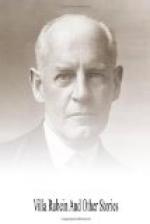It was annoying, but rather impressive. The man seemed even taller than before; there was a cut on his cheek, the blood from which was trickling down his beard. “You English!” he said. “I saw you stone Haynau—I saw you cheer Kossuth. The free blood of your people cries out to us.” He looked at Swithin. “You are a big man, you have a big soul—and strong, how you flung them down! Ha!” Swithin had an impulse to take to his heels. “My name,” said the Hungarian, “is Boleskey. You are my friend.” His English was good.
‘Bulsh-kai-ee, Burlsh-kai-ee,’ thought Swithin; ‘what a devil of a name!’ “Mine,” he said sulkily, “is Forsyte.”
The Hungarian repeated it.
“You’ve had a nasty jab on the cheek,” said Swithin; the sight of the matted beard was making him feel sick. The Hungarian put his fingers to his cheek, brought them away wet, stared at them, then with an indifferent air gathered a wisp of his beard and crammed it against the cut.
“Ugh!” said Swithin. “Here! Take my handkerchief!”
The Hungarian bowed. “Thank you!” he said; “I couldn’t think of it! Thank you a thousand times!”
“Take it!” growled Swithin; it seemed to him suddenly of the first importance. He thrust the handkerchief into the Hungarian’s hand, and felt a pain in his arm. ‘There!’ he thought, ‘I’ve strained a muscle.’
The Hungarian kept muttering, regardless of passers-by, “Swine! How you threw them over! Two or three cracked heads, anyway—the cowardly swine!”
“Look here!” said Swithin suddenly; “which is my way to the Goldene Alp?”
The Hungarian replied, “But you are coming with me, for a glass of wine?”
Swithin looked at the ground. ‘Not if I know it!’ he thought.
“Ah!” said the Hungarian with dignity, “you do not wish for my friendship!”
‘Touchy beggar!’ thought Swithin. “Of course,” he stammered, “if you put it in that way—”
The Hungarian bowed, murmuring, “Forgive me!”
They had not gone a dozen steps before a youth, with a beardless face and hollow cheeks, accosted them. “For the love of Christ, gentlemen,” he said, “help me!”
“Are you a German?” asked Boleskey.
“Yes,” said the youth.
“Then you may rot!”
“Master, look here!” Tearing open his coat, the youth displayed his skin, and a leather belt drawn tight round it. Again Swithin felt that desire to take to his heels. He was filled with horrid forebodings—a sense of perpending intimacy with things such as no gentleman had dealings with.
The Hungarian crossed himself. “Brother,” he said to the youth, “come you in!”




